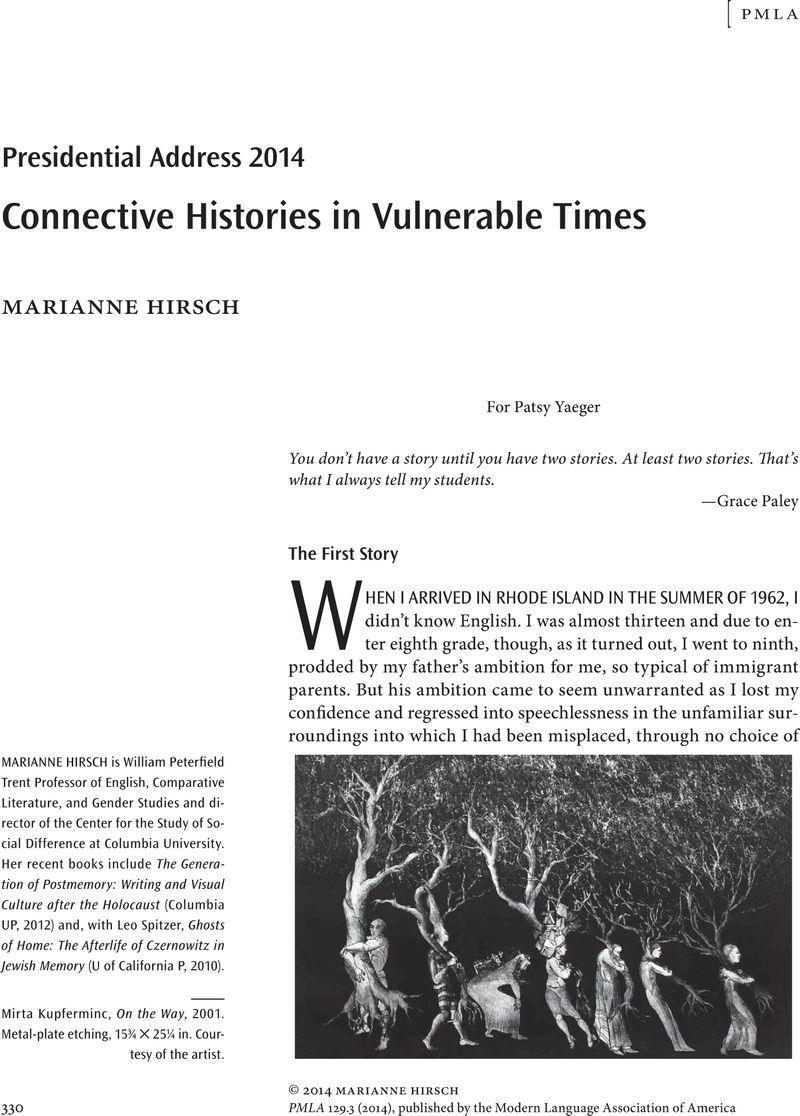Crossref Citations
This article has been cited by the following publications. This list is generated based on data provided by Crossref.
Hamer, Carla
2016.
A collaborative methodology between photography and performance in ethnographically informed research.
Critical Arts,
Vol. 30,
Issue. 3,
p.
341.
2016.
Vulnerability in Resistance.
p.
303.
Iyer, Nalini
2016.
Multiple Migrations: Partition and South Asian Canadian Writing.
South Asian Review,
Vol. 37,
Issue. 1,
p.
51.
Kim Stone, E.
2017.
Madness in Black Women’s Diasporic Fictions.
p.
267.
Flinn, Margaret C.
2019.
Olivier Assayas’ Memories of May.
Contemporary French and Francophone Studies,
Vol. 23,
Issue. 2,
p.
216.
Kietrys, Kyra A.
2019.
New Approaches to Translation, Conflict and Memory.
p.
163.
Sharick, Amanda K.
Smeltzer, Erica G.
and
Trostel, Katharine G.
2019.
Doing Memory Research.
p.
129.
Bouzonviller, Elisabeth
2020.
A mother travelling through motherland: Louise Erdrich’s family trip in Ojibwe Country.
Studies in Travel Writing,
Vol. 24,
Issue. 3,
p.
206.
Dellios, Alexandra
2020.
‘It was just you and your child’: Single migrant mothers, generational storytelling and Australia’s migrant heritage.
Memory Studies,
Vol. 13,
Issue. 4,
p.
586.
Rodriques, Janelle
2022.
“It’s enough to survive through this hell to make ourselves immortal in the eyes of our descendants:” Myal, death and mourning inDie the Long Day.
Cultural Dynamics,
Vol. 34,
Issue. 1-2,
p.
28.
Navarro-Tejero, Antonia
2022.
Cultural Representations of Gender Vulnerability and Resistance.
p.
207.
Berek, Mathias
Dimbath, Oliver
Leonhard, Nina
and
Rauer, Valentin
2022.
Handbuch Sozialwissenschaftliche Gedächtnisforschung.
p.
1.
Toji, Simone
2023.
Floating sentiments: silence and memory in the encounter between the celebration of Tooro Nagashi and the intangible cultural heritage policy in Brazil.
International Journal of Heritage Studies,
Vol. 29,
Issue. 4,
p.
260.
Berek, Mathias
Dimbath, Oliver
Leonhard, Nina
and
Rauer, Valentin
2023.
Handbuch Sozialwissenschaftliche Gedächtnisforschung.
p.
539.
Brutsche, Vanessa
2024.
Viral Camus: Mapping cultural memory in the Covid era.
Memory Studies,
Vol. 17,
Issue. 4,
p.
970.
Kapila, Shuchi
2024.
Postmemory and the Partition of India.
p.
1.
Vargas-Downing, Victoria
2024.
Changing language, changing heritage: the future behind us.
International Journal of Heritage Studies,
Vol. 30,
Issue. 12,
p.
1487.



